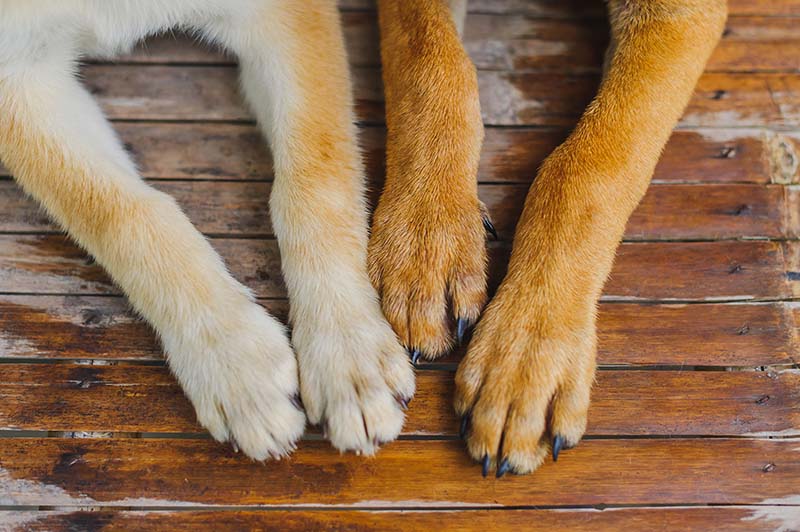
If you own a dog, you know that they can be stinky for various reasons. Their oily coats serve a useful purpose, even if we don’t want wet dogs in our homes or cars. Another unusual olfactory issue, however, is their so-called Frito feet.
The ingredients in Fritos are short and straightforward. The original flavor only contains corn, corn oil, and salt 1. There’s not a lot to dislike. Yet, some people find the smell unpleasant and even offensive. Unusual odors are often a red flag when it comes to pets, however, which may make you wonder whether it’s normal or a sign of an underlying problem when your dog smells like Fritos.
Ripe for Trouble
A dog’s coat protects them from extreme temperatures and environmental factors. It keeps harmful UV radiation from giving your pup a sunburn or worse. However, it’s also a problem waiting to happen. Your pet’s fur can harbor parasites, bacteria, and fungi, which can cause serious skin infections. Water-loving dogs with thick coats that take a while to dry can be especially susceptible to certain infections.
That’s where the answer to this question lies—with the isovaleric acids produced by yeast and bacteria belonging to the genus Pseudomonasand Proteus. This acid has a cheesy odor.
Some dogs are more likely to smell like corn chips than others. Labrador Retrievers and Golden Retrievers are two classic examples because of the nature of their coats and their love of swimming. Excess moisture sets the stage for yeast and bacteria to develop.
Other breeds prone to this condition include those with skin folds, like Shar Peis and Pugs. The same thing happens even though their coats are relatively short. Likewise, Proteus can also frequently occur on a dog’s paws. With nothing covering their feet and the skin folds between the digits, it’s hard to avoid it. The bacteria exist in the soil 2. Add a pup’s tendency to lick their paws, and you have the perfect storm.

When to Worry
Getting used to dog odors is part of being a pet owner—usually. It can be a harbinger of something worse. After all, we’re talking about bacteria and yeast, which can also be bad things. If you notice a change in the strength or muskiness of the smell, that warrants a visit to the vet. Other signs of an issue include the following:
Skin Infections
Excessive licking is a red flag that something is wrong. Your pup may have broken a nail or hurt their paw. Swelling, redness, itching, and a warm sensation are signs that your dog’s immune system is responding to an issue.
Wound healing is a three-stage process 3. These initial signs represent inflammation as your dog’s body starts to repair the damage and fend off pathogens or disease-causing organisms like bacteria. This is followed by proliferation and remodeling. Treatment and protection of the wound are essential for preventing secondary infections that can prolong healing.

Food Allergies
Food allergies are often a tough nut to crack because of the signs that they cause. You’d probably be more inclined to think your dog has fleas with their constant scratching. However, food allergies can also lead to itchy skin and paws. That can make your pet more susceptible to bacterial infections if the skin is broken. Of course, licking their feet will aggravate an existing yeast or bacterial overgrowth condition, making them smell even worse.
Contrary to popular belief, a gold-standard allergy test doesn’t exist. The best way to diagnose an issue is with an elimination diet. Dogs are most likely to be allergic to animal-based proteins, like chicken and beef. Grain allergies are extremely rare and virtually non-existent in cats. While food allergies are uncommon, excessive licking is a classic sign.
Controlling the Odor
Completely eliminating all the bacteria is impossible, given a dog’s lifestyle. However, we don’t recommend trying to cover up the odor. Canines have a much keener sense of smell than humans have, with over 17 times the number of sensory receptor sites. Using a scented product on your pup will likely overwhelm them. Instead, you can use unscented wipes made for pets.
We also suggest wiping your dog’s feet and coat when you come home after a walk or let them in from the backyard. Ensure that your dog’s coat and especially any skin folds get properly dried. Regularly clean your dog’s bedding.
The smell by itself is just a sign of microorganism overgrowth in your dog’s skin. To prevent this from becoming an issue, regularly practice grooming and hygiene methods. A healthy population of microorganisms in your dog’s skin without certain species overgrowth is the goal, so eliminating conditions like humidity can be a real game-changer.
Final Thoughts
Dogs live in a world of scents, some good and some bad. This also applies to their coats and feet. An especially stinky pup may have an overgrowth of certain yeast or bacterial species for various reasons, such as temperature and humidity changes that provide beneficial conditions for their reproduction. If you notice changes in how your dog smells, review your grooming and hygiene methods. If this does not resolve the issue, make an appointment with your vet to investigate it further before it becomes a serious problem.
See Also:
- Why Does My Dog Smell Like Burnt Hair? Reasons, Suggestions & FAQs
- Why Does My Dog Smell Like Maple Syrup? 6 Reasons & What to Do
Featured Image Credit: san4ezz, Shutterstock







